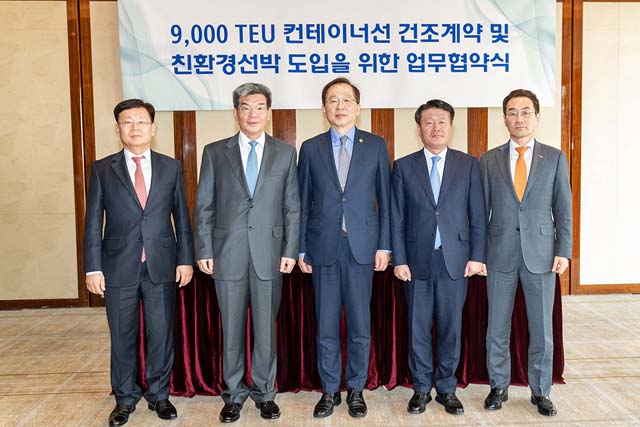HMM (the former Hyundai Merchant Marine) has announced newbuilding contracts with Hyundai Samho Heavy Industries(HSHI) and HJ Shipbuilding and Construction(HJSC) for nine 9,000 TEU containerships powered by methanol dual-fuel engines.
HMM’s mid-to-long-term strategy is to become a global top-rated shipping and logistics company through enhancing fleet competitiveness. With the order of methanol-powered containerships, HMM has taken an initial step toward expanding its eco-friendly fleet using alternative fuels.
Methanol significantly reduces GHG emissions compared to conventional oil-based fuels, bringing an immediate improvement in air quality around ports and shipping lanes. SOx and particulate matter emissions are virtually eliminated and NOx emissions are cut by 80%. Furthermore, methanol’s biodegradable and water-soluble qualities significantly reduce the risk to marine environments.
Under the agreement, HSHI and HJSC will build seven and two vessels, respectively, costing a total of US$ 1.12bn. The ships are scheduled to be deployed on the Asia-North/Latin America trade lanes and the Asia-India routes, with expected delivery from 2025 to 2026. HMM had in mind, when placing the orders, the green shipping corridor proposals between Busan in Korea and key ports in the US as potential routes to operate the new ships.
HMM has signed a Memorandum of Understanding (MoU) with five fuel suppliers, including Proman, PTTEP, European Energy, Hyundai Corporation and so on, to secure the supply of methanol for its newly-ordered vessels. HMM is to conduct a feasibility study with each partner to procure various types of methanol in its main bunkering ports and, subsequently, will collaborate to produce green methanol as part of developing carbon-neutral fuels.
HMM has committed to reaching net-zero carbon emissions across its fleet by 2050. To achieve the target, HMM is exploring a range of sustainable energy sources, including methanol, LNG, hydrogen, and green ammonia.
HMM President and CEO Kyung Bae said: “We will continue to drive efforts to support the global community’s broader transition to carbon neutrality while at the same time strengthening our fundamental level of future capability in the face of increasingly fierce competition in the global market.”



